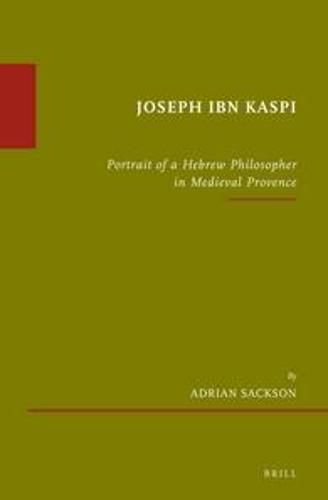Readings Newsletter
Become a Readings Member to make your shopping experience even easier.
Sign in or sign up for free!
You’re not far away from qualifying for FREE standard shipping within Australia
You’ve qualified for FREE standard shipping within Australia
The cart is loading…






Joseph Ibn Kaspi was among the most prolific philosophical writers in one of the most vibrant, productive, creative periods in the history of Jewish philosophy. Born around 1280 in Provence, Ibn Kaspi penned works engaging a broad range of fields, including philosophy, theology, grammar, logic, biblical exegesis, and interreligious polemics. In Joseph Ibn Kaspi: Portrait of a Hebrew Philosopher in Medieval Provence, Adrian Sackson asks the question: What was Ibn Kaspi’s overarching intellectual project? The book focuses on several key themes: Ibn Kaspi’s conception of the formative (not just discursive) function of philosophy; his multi-layered esotericism; his distinct approach to the interpretation of Maimonides; his Maimonidean-philosophical approach to the interpretation of religious texts and practices; his Platonic political thought; his approach to messianism, and his attendant conception of the nature of human history.
$9.00 standard shipping within Australia
FREE standard shipping within Australia for orders over $100.00
Express & International shipping calculated at checkout
Joseph Ibn Kaspi was among the most prolific philosophical writers in one of the most vibrant, productive, creative periods in the history of Jewish philosophy. Born around 1280 in Provence, Ibn Kaspi penned works engaging a broad range of fields, including philosophy, theology, grammar, logic, biblical exegesis, and interreligious polemics. In Joseph Ibn Kaspi: Portrait of a Hebrew Philosopher in Medieval Provence, Adrian Sackson asks the question: What was Ibn Kaspi’s overarching intellectual project? The book focuses on several key themes: Ibn Kaspi’s conception of the formative (not just discursive) function of philosophy; his multi-layered esotericism; his distinct approach to the interpretation of Maimonides; his Maimonidean-philosophical approach to the interpretation of religious texts and practices; his Platonic political thought; his approach to messianism, and his attendant conception of the nature of human history.